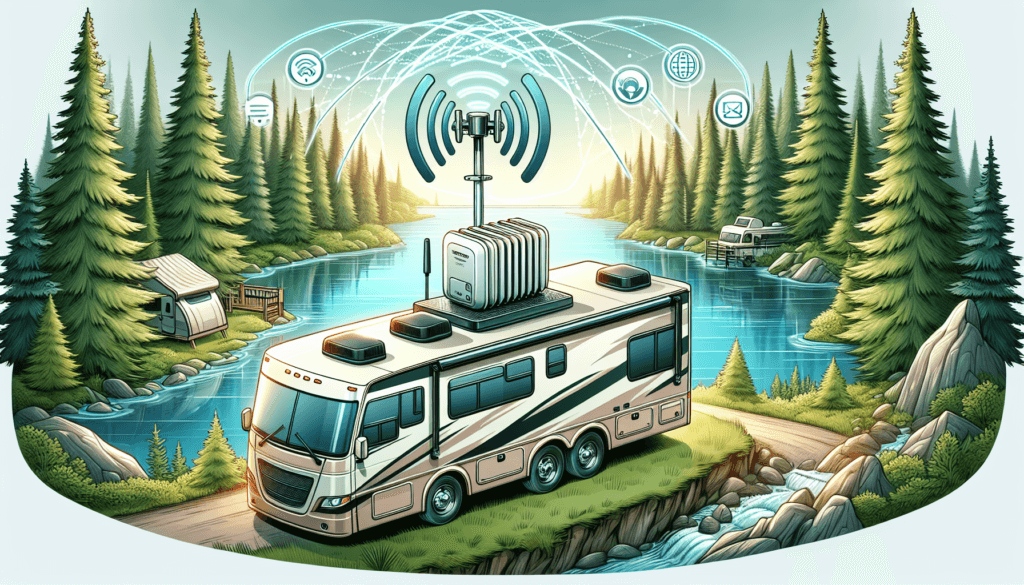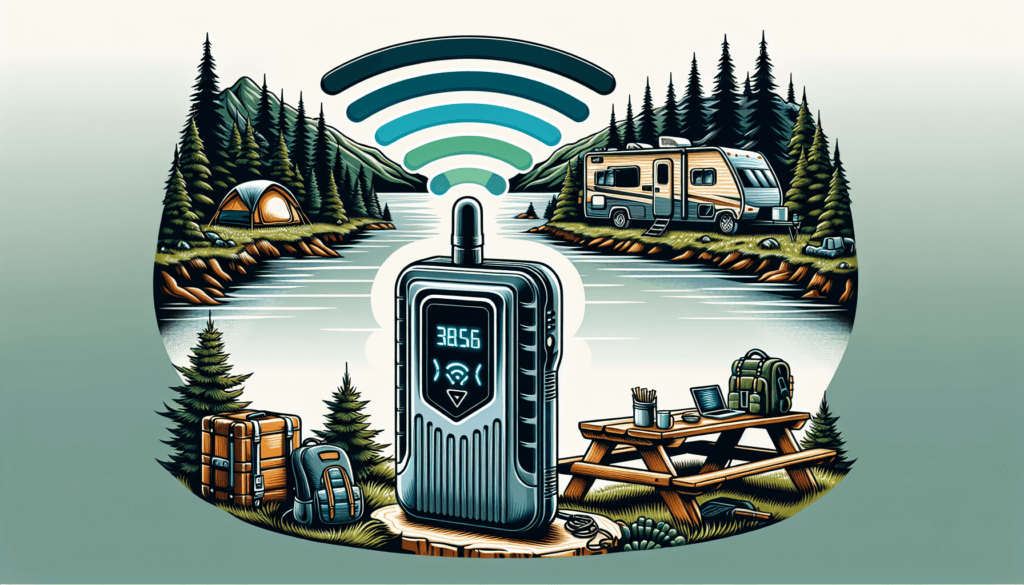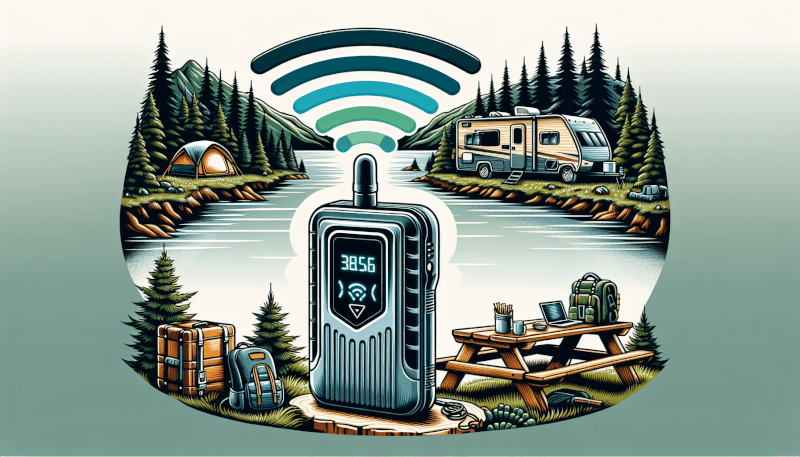Are you an avid RV camper looking for ways to stay connected while on your adventures? Look no further! In this article, we will explore the top ways to stay connected while RV camping. From reliable mobile hotspots to satellite internet, we’ve got you covered. Stay tuned to discover how you can stay connected and make the most out of your camping experience!

Satellite Internet
If you’re someone who loves RV camping but still wants to stay connected to the online world, satellite internet is a must-have. With satellite internet, you can enjoy high-speed internet access no matter where you are. This technology uses satellites in space to provide internet connectivity to remote areas, making it a perfect solution for RV campers who like to explore off-the-grid locations.
Satellite internet works by transmitting data between a dish installed on your RV and a satellite in space. This means that as long as you have a clear line of sight to the satellite, you can have internet access almost anywhere. The speed and reliability of satellite internet have improved significantly over the years, making it a viable option for RV campers who rely on a stable internet connection for work, entertainment, or staying connected with loved ones.
Benefits of Satellite Internet for RV Camping
One of the biggest advantages of satellite internet for RV camping is its wide coverage area. Unlike other options, such as cellular data or Wi-Fi extenders, satellite internet can keep you connected even in remote areas where other forms of internet may be scarce or unreliable. This is particularly beneficial for those who enjoy boondocking or camping in secluded natural settings.
Another benefit of satellite internet is its consistent speed and reliability. While cellular data may be subject to network congestion and Wi-Fi extenders can be affected by distance and interference, satellite internet offers a more stable connection. This is especially crucial for RV campers who rely on the internet for work or need a reliable connection for streaming movies and TV shows.
Cellular Data
When it comes to staying connected while RV camping, cellular data is a popular and widely available option. If you have a smartphone or a mobile hotspot device, you can use your cellular data plan to get online wherever there is a cellular network signal. Many RV campers opt for this option because of its convenience and widespread coverage.
Using cellular data is fairly simple. Just turn on the data connection on your device, and you’re ready to surf the internet, check emails, use navigation apps, and more. The speed and reliability of your cellular data connection may vary depending on your location and network provider, but in general, it provides a decent internet experience for most day-to-day activities.
Tips for Optimizing Cellular Data Usage
While cellular data is convenient, it’s essential to optimize its usage to avoid hitting data caps or experiencing slow speeds. Here are some tips to help you make the most of your cellular data while RV camping:
Be mindful of data-hungry applications: Streaming videos, online gaming, and automatic app updates consume a significant amount of data. Use these services sparingly or connect to a Wi-Fi network whenever possible.
Download offline maps: Navigation apps can quickly eat up your data allowance if you constantly rely on them. Download offline maps for your destination before hitting the road to minimize data usage.
Use Wi-Fi when available: Take advantage of free Wi-Fi hotspots at RV parks, cafes, and other public places. This can help reduce your reliance on cellular data and potentially save you money on data plans.
Monitor your data usage: Most smartphones and mobile hotspot devices have settings that allow you to track your data usage. Keep an eye on your consumption to avoid going over your data limit.
By following these tips, you can maximize the usefulness of your cellular data while RV camping and ensure you have enough data to stay connected throughout your trip.

Wi-Fi Extenders
While RV parks and campgrounds often offer Wi-Fi access, the signal may not always be strong enough to reach all areas of your RV. This is where Wi-Fi extenders come in handy. A Wi-Fi extender, also known as a range extender or booster, is a device that can amplify and extend an existing Wi-Fi signal, allowing you to enjoy a stable connection throughout your RV.
Wi-Fi extenders work by receiving the Wi-Fi signal from an access point and then rebroadcasting it to areas with weaker coverage. Essentially, they act as intermediaries between your device and the original Wi-Fi source, increasing the range and improving the signal strength. This means you can comfortably work, stream movies, or browse the web from the comfort of your RV without having to be right next to the campground’s Wi-Fi hotspot.
Choosing the Right Wi-Fi Extender
When choosing a Wi-Fi extender for your RV, there are a few key factors to consider. First and foremost, you need to ensure compatibility with the Wi-Fi standards supported by the RV park or campground’s network. Most modern Wi-Fi extenders support the widely used 802.11n and 802.11ac standards, but it’s always a good idea to double-check before making a purchase.
Additionally, consider the range and coverage area of the extender. The larger the RV, the more range you’ll need to ensure a strong signal in every corner. Some extenders also come with external antennas that can further boost the signal strength, making them ideal for RVs with thicker walls or metal exteriors that may interfere with Wi-Fi signals.
Lastly, pay attention to ease of setup and use. Look for extenders that have straightforward installation processes and user-friendly interfaces. After all, you’re likely to be on the move and don’t want to spend too much time configuring complicated network settings.
Overall, a Wi-Fi extender can be a valuable addition to your RV camping setup, allowing you to fully enjoy the convenience of campground Wi-Fi without being limited to specific areas or sacrificing signal strength.
RV Park Wi-Fi
Many RV parks and campgrounds offer Wi-Fi access for their guests. This can be a convenient way to stay connected without relying on cellular data or other internet options. However, it’s important to note that the quality and reliability of RV park Wi-Fi can vary greatly.
When relying on RV park Wi-Fi, it’s crucial to manage your expectations and be prepared for potential limitations. While some RV parks provide fast and reliable Wi-Fi, especially in common areas and designated Wi-Fi zones, others may struggle to maintain a consistent connection due to factors like overcrowding, limited bandwidth, or technical issues.
To make the most of RV park Wi-Fi, consider the following tips:
Check reviews and ask fellow RVers: Before booking a stay at an RV park, research the quality of their Wi-Fi by reading reviews, asking fellow RVers in online forums or social media groups, or contacting the park directly. This will give you a better idea of what to expect in terms of speed and reliability.
Choose the right spot: If you have the flexibility to choose your parking spot within the RV park, opt for a location closer to the Wi-Fi hotspot or the office where the router is located. This can improve your chances of getting a stronger signal.
Be mindful of peak times: RV park Wi-Fi can become congested during peak usage hours, such as mornings and evenings when people are more likely to be online. Try to plan your internet usage during non-peak hours to avoid slower speeds.
Consider a Wi-Fi extender: If the RV park’s Wi-Fi signal doesn’t reach your RV, a Wi-Fi extender can help amplify the signal and provide better coverage. Just make sure to follow the campground’s rules and regulations regarding the use of extenders.
By setting realistic expectations and using these tips, you can make the most of RV park Wi-Fi and enhance your connectivity while enjoying the campground’s amenities and natural surroundings.

Mobile Hotspots
For RV campers who prioritize flexibility and mobility, mobile hotspots are an excellent solution for staying connected. Mobile hotspots, also known as pocket Wi-Fi or Mi-Fi devices, are small portable devices that allow you to create a Wi-Fi network wherever you have a cellular data connection.
To use a mobile hotspot, you need to have a separate data plan specifically for the device. Similar to using cellular data on your smartphone, mobile hotspots rely on a cellular network to provide internet connectivity. However, instead of connecting to the internet directly through your smartphone, you connect your devices (such as laptops, tablets, or smart TVs) to the Wi-Fi network created by the mobile hotspot.
Mobile hotspots are highly convenient for RV camping because they offer a private Wi-Fi network that you can secure with a password, making it a safe option for sensitive online activities. Additionally, they allow you to connect multiple devices simultaneously, making them ideal for families or groups traveling together.
Choosing a Mobile Hotspot Provider
When choosing a mobile hotspot provider, there are a few factors to consider. First and foremost, check the coverage availability and reliability in the areas you plan to visit. Different providers have varying coverage maps, so ensure the provider you choose has a strong connection in the places you frequent or intend to explore.
Next, compare the data plans and pricing. Look for plans that offer a sufficient amount of data for your needs without breaking the bank. Consider your typical internet usage and whether you’ll be using the hotspot for basic web browsing, streaming videos, or work-related activities. Some providers also offer unlimited data plans, which can be a great option if you anticipate heavy internet usage.
Lastly, take note of any extra features or perks offered by the provider. Some mobile hotspot plans come with additional benefits like free access to streaming services, discounts on travel-related expenses, or added security features.
By carefully considering these factors, you can select a mobile hotspot provider that best meets your connectivity needs while RV camping.
Wired Internet Connection
While wireless internet options are convenient and widely available, sometimes a wired internet connection can offer more stability and reliability. If you’re staying at a campground or RV park with wired internet infrastructure, you can take advantage of this option to enjoy a fast and reliable internet connection right in your RV.
To connect to a wired internet connection in your RV, you’ll need an Ethernet cable and a compatible modem or router with an Ethernet port. Some RVs come equipped with built-in Ethernet ports, while others may require additional hardware. Consult your RV’s manual or contact the manufacturer to determine the best setup for your specific model.
Once you have the necessary equipment, connecting to a wired internet connection is as simple as plugging the Ethernet cable into your RV’s Ethernet port and the other end into the campground’s provided network connection. This type of connection provides a direct link to the local network, often resulting in faster speeds and lower latency compared to wireless options.
It’s worth noting that not all campgrounds or RV parks offer wired internet connections. Therefore, if having a wired connection is essential to your connectivity needs, it’s recommended to research and confirm the availability of this option before making your reservation.

TV Antennas
While staying connected typically implies internet access, many RV campers also enjoy keeping up with their favorite TV shows and news updates. In this case, a TV antenna can be a valuable addition to your RV setup. A TV antenna, also known as an over-the-air (OTA) antenna, allows you to pick up broadcast signals from local TV stations, providing access to free-to-air television channels.
With a TV antenna, you can enjoy a variety of channels depending on the broadcast coverage in the area you’re camping in. This means you can stay up to date with news, enjoy live sports events, or simply unwind with your favorite TV programs without relying solely on cable or streaming services.
Choosing the Right TV Antenna
When selecting a TV antenna for your RV, consider the following factors:
Range and Signal Strength: The range of the antenna determines the distance it can receive signals from. Opt for an antenna with a long enough range to capture signals from nearby broadcasting towers. Additionally, choose an antenna with high signal strength ratings to ensure optimal picture quality.
Omnidirectional vs. Directional: Omnidirectional antennas capture signals from all directions, making them ideal for RV campers who frequently change locations. Directional antennas, on the other hand, need to be pointed towards the broadcasting towers and are best suited for stationary RVs.
Amplification: Some TV antennas come with built-in amplifiers that enhance the received signal, especially in areas with weak broadcast coverage. Amplified antennas can improve picture quality and reduce interference caused by obstacles or distance from broadcasting towers.
Installation and Storage: Consider the ease of installation and storage of the TV antenna. Some antennas are designed to be permanently mounted on your RV’s roof, while others are portable and can be easily set up and taken down.
By considering these factors and your specific usage needs, you can choose a TV antenna that enhances your RV camping experience by providing free access to local television channels.
Satellite TV
For RV campers who enjoy a wide range of entertainment options, satellite TV is a popular choice. Satellite TV allows you to access hundreds of channels, including premium movie networks, sports channels, and more. With a satellite TV subscription and the necessary equipment, you can have a diverse selection of programming right in your RV.
To enjoy satellite TV in your RV, you’ll need a satellite dish and a receiver. The satellite dish is responsible for picking up signals from satellites in space, while the receiver processes those signals and transmits them to your TV for viewing. There are options available specifically designed for RVs, with portable satellite dishes that can be easily set up and oriented towards the satellites.
Satellite TV offers a wide range of channels and programming packages to suit various preferences and interests. Whether you’re a sports enthusiast, a movie lover, or enjoy catching up with the latest TV series, you can find a package that caters to your entertainment needs. Some satellite TV providers even offer DVR (Digital Video Recorder) services, allowing you to record shows and movies to watch at your convenience.
While satellite TV provides excellent coverage and a vast selection of channels, it’s important to note that it requires a clear line of sight to the satellite and can be affected by weather conditions. Therefore, when choosing this option for your RV, consider the locations and weather patterns you are likely to encounter during your travels.

Streaming Services
With the rise of streaming services, entertainment options while RV camping have expanded beyond the traditional TV channels. Services like Netflix, Hulu, Amazon Prime Video, and Disney+ have revolutionized the way we consume movies and TV shows, offering a vast library of on-demand content.
Streaming services are ideal for RV campers who prefer the flexibility of choosing what to watch and when to watch it. With a reliable internet connection, you can access these services on various devices, including smart TVs, laptops, tablets, and smartphones. This means you can enjoy your favorite shows and movies in the comfort of your RV or even during outdoor movie nights under the stars.
To use streaming services while RV camping, ensure you have a stable and fast internet connection. Options like satellite internet, cellular data, RV park Wi-Fi, or mobile hotspots can provide the necessary connectivity. Additionally, consider your data allowance if using cellular data or a mobile hotspot, as streaming video content can consume a significant amount of data.
When choosing streaming services, explore the libraries and content offerings of different providers to find the ones that align with your preferences. Some services specialize in specific genres, while others offer a broader range of content. You can also take advantage of free trials to test out different services before committing to a subscription.
Ultimately, streaming services can be a fantastic way to stay entertained and connected to the latest shows and movies while RV camping, offering a vast selection of content to suit every taste.
Social Media and Online Forums
While staying connected typically refers to internet access, social media platforms and online forums are also essential for many RV campers looking to connect with fellow enthusiasts, share experiences, and gather valuable information.
Social media platforms like Facebook, Instagram, and Twitter offer RV camping communities and groups where like-minded individuals can interact, share tips, and exchange recommendations for campsites, parks, and other travel-related topics. Joining these groups allows you to connect with other RVers, gain insights into popular destinations, and be part of supportive online communities.
In addition to social media, online forums dedicated to RV camping provide valuable resources for everything from troubleshooting technical issues to finding the best RV accessories. These forums offer a platform for asking questions, seeking advice, and sharing experiences with a community of experienced RVers.
To fully leverage the benefits of social media and online forums, consider the following tips:
Engage actively: Be an active participant in the communities you join. Ask questions, offer insights, and share your own experiences. This not only helps you connect with others but also fosters a supportive environment for everyone involved.
Share responsibly: When posting on social media or forums, ensure you only share information that you’re comfortable making public. Avoid sharing details that may compromise your privacy or security.
Follow guidelines and rules: Each social media platform and online forum has its own set of guidelines and rules. Familiarize yourself with them to ensure you’re contributing positively and respecting the community’s standards.
Seek reputable advice: While social media and online forums can offer valuable advice and insights, always verify information from reliable sources. When it comes to technical or safety-related matters, consult official manuals or reach out to professionals for accurate guidance.
By actively engaging in social media and online forums dedicated to RV camping, you can create meaningful connections, learn from others’ experiences, and enhance your RVing journey. Remember to approach these platforms with an open mind and respect for fellow members to foster a positive and supportive community.


